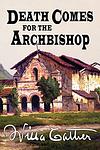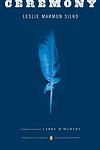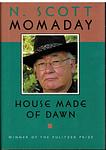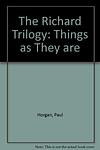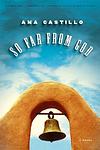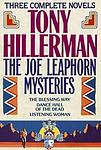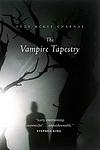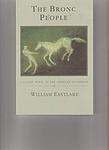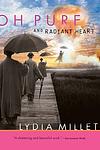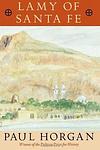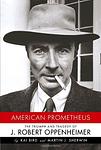The Greatest "New Mexico" Books of All Time
Click to learn how this list is calculated.
This list represents a comprehensive and trusted collection of the greatest books. Developed through a specialized algorithm, it brings together 284 'best of' book lists to form a definitive guide to the world's most acclaimed books. For those interested in how these books are chosen, additional details can be found on the rankings page.
Genres
Countries
Date Range
Reading Statistics
Click the button below to see how many of these books you've read!
Download
If you're interested in downloading this list as a CSV file for use in a spreadsheet application, you can easily do so by clicking the button below. Please note that to ensure a manageable file size and faster download, the CSV will include details for only the first 500 books.
Download-
1. Death Comes for the Archbishop by Willa Cather
This novel follows the life of a Catholic bishop and a vicar as they attempt to establish a diocese in New Mexico Territory. The story highlights their struggles and triumphs over the course of 40 years, dealing with the harsh landscape, cultural differences, and the challenges of faith. It also explores the history and culture of the Southwest, including the influence of Mexican and Native American traditions.
-
2. Ceremony by Leslie Marmon Silko
"Ceremony" is a novel that explores the life of Tayo, a World War II veteran of mixed Laguna Pueblo and white heritage. After returning from the war, Tayo struggles with post-traumatic stress disorder and alcoholism. The novel charts his journey towards healing, which involves embracing his Native American heritage and the traditional ceremonies of his people. Along the way, he must confront racism, poverty, and the destructive forces of Western culture, ultimately finding solace and redemption in the ancient rituals and wisdom of his ancestors.
-
3. Bless Me, Ultima by Rudolfo Anaya
The novel follows the story of a young boy in New Mexico in the 1940s who navigates the challenges of adolescence, faith, and identity with the guidance of a wise old woman named Ultima. Throughout the narrative, the boy grapples with moral dilemmas, the complexities of his Mexican-American heritage, and the clash between the Catholic faith and the traditional spiritual beliefs of his ancestors. The story is a rich tapestry of folklore, spirituality, and personal growth.
-
4. House Made of Dawn by N. Scott Momaday
The novel delves into the life of a young Native American man named Abel who returns home to his New Mexico Pueblo reservation after serving in World War II. Struggling with the trauma of war and the cultural dislocation caused by years away from his traditional tribal life, Abel tries to find his identity and place in a world that is torn between ancient tribal traditions and the modern white society. His journey of self-discovery and redemption is poignantly narrated, highlighting the struggles faced by Native Americans in the contemporary world.
-
5. The Richard Trilogy by Paul Horgan
"The Richard Trilogy" is a collection of three novels that follow the life of Richard, a young man from New Mexico, from his childhood to adulthood. The trilogy explores the themes of family, love, loss, and personal growth against the backdrop of the American Southwest. The protagonist navigates the challenges of growing up, the complexities of relationships, and the pursuit of his dreams, all while dealing with the societal and cultural changes of his time.
-
6. So Far From God by Ana Castillo
The novel is a vibrant and magical realist portrayal of the lives of a mother and her four daughters in the small town of Tome, New Mexico. Blending elements of Mexican-American folklore and contemporary issues, it tells the story of the family's struggles and triumphs, weaving in themes of cultural identity, feminism, and spirituality. The narrative is rich with the supernatural and the everyday, as the characters confront challenges such as illness, economic hardship, and personal loss, while also experiencing miraculous and extraordinary events. Through their journey, the book explores the intersection of tradition and modernity, and the resilience of women within a community.
-
7. Portrait Of An Artist: A Biography Of Georgia O'keeffe by Laurie Lisle
This biography provides an in-depth look at the life and career of a pioneering American artist known for her distinctive paintings of flowers, skyscrapers, and southwestern landscapes. It delves into her personal journey, exploring her relationships, her struggles for artistic independence, and her role in the American modernist movement. The book paints a vivid picture of a fiercely independent and spirited woman who broke boundaries in both her art and her life, offering readers a comprehensive view of her creative evolution and the impact she had on the art world.
-
8. Dance Hall Of The Dead by Tony Hillerman
In this mystery novel, two Native American boys disappear, leading a seasoned Navajo Tribal Police lieutenant to investigate their fate amidst the sacred Zuni and Navajo lands. The search for the truth takes him deep into the religious and cultural traditions of the Southwestern tribes, where he uncovers a complex web of ancient rituals, personal vendettas, and secrets that are as old as the arid landscape itself. As the lieutenant delves further into the case, he must navigate the delicate balance between upholding the law and respecting tribal customs, all while racing against time to solve the crime before the killer strikes again.
-
9. The Vampire Tapestry by Suzy McKee Charnas
The novel follows the life of Dr. Edward Weyland, an anthropologist who is also a vampire, as he navigates the complexities of modern society while concealing his true nature. Unlike traditional vampires, Weyland does not rely on supernatural powers but instead uses his intellect and scientific understanding to satisfy his needs for blood and to study human behavior. The story is divided into five sections, each offering a different perspective on Weyland's interactions with humans, ranging from a psychologist who uncovers his secret to a victim who survives an attack. The book challenges the conventional tropes of vampire fiction by presenting the protagonist as a biological entity rather than a mystical creature, exploring themes of loneliness, identity, and the human condition.
-
10. The Last Of The Menu Girls by Denise Chávez
The book is a coming-of-age story that follows the life of a young Mexican-American woman as she navigates the complexities of identity, culture, and family in the American Southwest. Working as a menu girl in a hospital, she encounters a tapestry of human experiences that profoundly shape her understanding of the world and her place within it. Through a series of vignettes, the protagonist grapples with her aspirations, relationships, and the blending of her two worlds, ultimately seeking a sense of purpose and self-acceptance amidst the backdrop of a changing cultural landscape.
-
11. The Bronc People by William Eastlake
Set on a Navajo reservation during World War II, "The Bronc People" explores the complex relationships and cultural tensions between the Native American inhabitants and the white government officials. The story is centered on a young Navajo man who is torn between his traditional lifestyle and the modern world. The book provides a deep insight into the Navajo culture, their spiritual beliefs, and their struggle to preserve their identity amid external influences.
-
12. Timeline by Michael Crichton
In "Timeline" by Michael Crichton, a group of archaeologists and historians are given the opportunity to travel back in time to the 14th century. As they venture into the past to rescue their colleague, they find themselves caught in a dangerous and unpredictable world. Faced with medieval warfare, treachery, and the challenges of adapting to a different time period, they must race against time to survive and make it back to the present.
-
13. Fire In The Mind by George Johnson
This book delves into the intricate relationship between science, religion, and the search for meaning in the universe, set against the backdrop of Los Alamos, New Mexico—a place synonymous with the birth of the atomic bomb. The narrative explores how the quest for ultimate answers about the beginning of the universe and the fundamental nature of reality has shaped human thought across cultures and epochs. Through a blend of history, science, and philosophy, the author examines the human fascination with understanding the cosmos, weaving together stories of the scientists who worked on the Manhattan Project with broader reflections on the drive to find coherence in the complexity of the universe. This thought-provoking work challenges readers to ponder the deep questions of existence and the fiery human mind's role in the quest for knowledge and meaning.
-
14. Oh Pure And Radiant Heart by Lydia Millet
In "Oh Pure and Radiant Heart," three scientists responsible for the development of the atomic bomb—Oppenheimer, Fermi, and Szilard—mysteriously appear in the 21st century. Unaware of how they got there, they confront a world shaped by the very technology they helped create. As they grapple with their feelings of guilt and responsibility, they become involved with a librarian and her husband, embarking on a journey that takes them across the United States. The narrative weaves together the past and the present, exploring the impact of nuclear weapons on humanity and the scientists' quest for redemption in a world on the brink of forgetting the horrors of the past.
-
15. Grant by Ron Chernow
"Grant" is a comprehensive biography of the 18th President of the United States, Ulysses S. Grant. Written by Pulitzer Prize-winning author Ron Chernow, the book explores Grant's early life, military career, presidency, and post-presidential years. Chernow portrays Grant as a complex and often misunderstood figure, highlighting his military genius and leadership during the Civil War, as well as his struggles with alcoholism and financial ruin later in life. The book also delves into Grant's relationships with his wife, Julia, and political figures such as Abraham Lincoln and William Tecumseh Sherman. Overall, "Grant" offers a detailed and nuanced portrait of one of America's most significant historical figures.
-
16. Lamy of Santa Fe by Paul Horgan
"Lamy of Santa Fe" is a historical biography that tells the story of Jean-Baptiste Lamy, a French Catholic priest who became the first Archbishop of Santa Fe, New Mexico. The book explores his life and work, including his efforts to build the Cathedral Basilica of St. Francis of Assisi, his conflicts with local clergy, and his role in the cultural and religious evolution of the region. The narrative provides a comprehensive look at the history of the American Southwest during the 19th century.
-
17. American Prometheus by Kai Bird, Martin J. Sherwin
"American Prometheus" is a biography that explores the life of the physicist who led the Manhattan Project, which developed the atomic bomb during World War II. This book offers a comprehensive look at his personal life, scientific achievements, and the moral implications of his work. It also delves into his political activism, his blacklisting during the McCarthy era, and his struggle with depression and cancer.
Reading Statistics
Click the button below to see how many of these books you've read!
Download
If you're interested in downloading this list as a CSV file for use in a spreadsheet application, you can easily do so by clicking the button below. Please note that to ensure a manageable file size and faster download, the CSV will include details for only the first 500 books.
Download